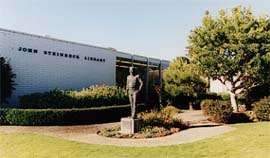Ann Arbor is also the birthplace of Borders Books, a megabookstore similar to Barnes & Noble. It started in the 70s as a small used bookstore and evolved into a superstore which, according to their website, serves “some 30 million customers annually in over 1,200 stores.”
The Borders’ website credits their success to, “a revolutionary inventory system that tailored each store’s selection to the community it served.” In other words, they applied small bookstore strategy–get to know the particulars of a customer’s reading habits–on a larger scale. Since Google has chosen Ann Arbor as one locus of its nascent megalibrary, I got to thinking, what might these two distributors have in common (besides A2)? Google might be taking a cue from Borders when it designs the cyberlibrarian to accompany its digital collection. The small bookstore owner learns, through interaction, what a particular community wants. Borders’ inventory system tracked what the client was buying and selling. Google may, likewise, be able to track your buying and selling, your searching and asking. Perhaps the automaton Google librarian will “know” you based on information accumulated by all the various Google searches you have conducted. Problem is, that’s marketing strategy, not educational strategy. Will the Google librarian be able to make intuitive leaps leading the browser to things he/she is not familiar with rather than to more of what he/she already knows? How will search engines answer the need for this kind of expertise?
Monthly Archives: January 2005
closing down salinas
 The 150,000 citizens of Salinas, California will soon be without a single public library – a drastic measure taken by the city to solve a drastic budget crisis. After a pair of last-minute ballot measures failed to win funds for the city’s embattled libraries, the doors will soon close on what is for many curious minds, the only resource in town.
The 150,000 citizens of Salinas, California will soon be without a single public library – a drastic measure taken by the city to solve a drastic budget crisis. After a pair of last-minute ballot measures failed to win funds for the city’s embattled libraries, the doors will soon close on what is for many curious minds, the only resource in town.
Is the local community library going extinct? (image: John Steinbeck Library, Salinas)
after a holiday visit to ann arbor: the u of m library & google
I have fond memories of studying in the University of Michigan libraries, (as a high school student, and later as a U of M undergraduate). The physical space of the library, the seemingly endless stacks of books, which allowed deep exploration of even the most obscure topics, and gave me a sense of how vast, (and how limited) the universe of human thought really is. How is this going to be translated in the virtual space of Google’s digital library?
Isn’t it the job of the University library to provide a young scholar with opportunities to “see” the scope of human knowledge? While at the same time, offering a kind of temple space for the engagement of these books. Without the marble staircases, the chandeliers, the stone pilasters, the big oak tables, the reference room, the stained glass windows, the hushed silence, how will we get the message that books are important, and that understanding them requires a particular “space.” The physical space of the library serves as a metaphor and a reminder of the serious mental space that needs to be carved out for productive study. What will we lose when that space becomes “virtual?” Are we “saving” space by putting everything in the computer? Or are we losing it?
